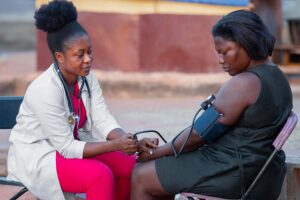In a world where medical advancements continuously save lives, umbilical cord blood banking is an innovation that many people in Nigeria may not fully understand or appreciate. Umbilical cord blood is rich in stem cells, which are essential in treating a variety of life-threatening diseases such as leukemia, lymphoma, sickle cell anemia, and even some forms of cancer. This often-overlooked resource is a powerful tool in healthcare, and it’s time for more Nigerians to recognize its potential.
Understanding the Importance of Umbilical Cord Blood
Umbilical cord blood banking is a relatively new concept in Nigeria, but it’s slowly gaining traction. The cord blood, which is collected from the umbilical cord after the birth of a baby, contains stem cells that have the potential to regenerate blood cells, repair damaged tissues, and even grow into new organs. These stem cells are highly valuable in treating conditions like blood cancers, immune system disorders, and genetic diseases.
The unique part about umbilical cord blood banking is that it offers the possibility to save lives not just today, but in the future. These stem cells have a longer shelf life, making them an essential resource for both the baby and potential future medical treatments. The stem cells in cord blood are genetically unique, offering a chance for personalized medicine in the future.
Why Umbilical Cord Blood Banking is a Smart Decision
1. Stem Cell Donation and the Fight Against Diseases
Stem cells from umbilical cord blood have been proven to help treat blood-related diseases, genetic disorders, and immune deficiencies. The stem cells in cord blood have regenerative properties that are essential for saving lives. Many Nigerians are unaware that stem cells from cord blood can treat life-threatening diseases like leukemia, sickle cell anemia, and lymphoma, saving thousands of lives annually. This makes banking cord blood an invaluable option for families.
2. A Lifesaver for the Baby and Family
For families with a history of genetic disorders or blood-related illnesses, umbilical cord blood banking is an essential step. If a family member falls ill with conditions like leukemia or lymphoma, the stored stem cells could be used to help treat that person. This also means that the newborn might benefit from their own stem cells in the future.
In the case of blood donation, a person may need stem cells for bone marrow transplants or other treatments. Many patients who receive stem cells from a match experience significant recovery and improved health.
3. Growing Popularity of Blood Donation and Stem Cell Banking in Nigeria
In recent years, blood donation, plasma donation, and stem cell banking have been gaining momentum in Nigeria. Institutions such as Oneus are leading the way in educating the public and providing high-quality services for blood donation, including plasma and stem cell banking. As awareness about the benefits of stem cell and blood donation grows, more Nigerians are choosing to participate in these life-saving practices.
The Role of Oneus in Blood Donation and Stem Cell Banking
Oneus stands out as one of the leading organizations in Nigeria focusing on blood donation and umbilical cord blood banking. With private cord blood banking options available, Oneus offers families the chance to store cord blood for future use, ensuring that it is accessible if the need arises. They provide a secure, efficient, and cost-effective way to store cord blood and stem cells, giving Nigerian families peace of mind.
Their blood donation and plasma donation services also contribute to the larger healthcare ecosystem, addressing shortages in blood plasma and blood products. Oneus is truly committed to saving lives by increasing access to life-saving treatments, promoting blood donation, and educating the public about the importance of stem cell preservation.
Risks of Not Donating Blood or Banking Umbilical Cord Blood
While blood donation is an established practice in Nigeria, many are still unaware of the profound impact it has on saving lives. Failing to donate blood, plasma, or umbilical cord blood can leave hospitals and patients in dire need of these essential resources. When it comes to blood plasma, platelet donation, and bone marrow donation, the need for these resources is critical. Hospitals depend on the generosity of donors to ensure that they have enough blood and plasma to meet the needs of patients.
Practical Tips for Blood Donation and Cord Blood Banking
-
Know Your Blood Group and Rhesus Factor: Before donating blood, it’s important to know your blood group and rhesus factor. This ensures compatibility and safety for recipients. For example, O positive blood is in high demand due to its universal compatibility.
-
Research Blood Donation Centers and Cord Blood Banks: Whether you’re interested in selling plasma or donating blood, find reputable plasma donation centers and blood banks. Oneus provides a trusted and genuine resource for blood donation in Nigeria, ensuring that your donation goes to the right cause.
-
Consider Umbilical Cord Blood Banking: If you’re expecting a child, consider banking the umbilical cord blood. It’s a simple, non-invasive procedure that can protect your child and loved ones in the future. The cost of cord blood banking is an investment in health, safety, and peace of mind.
Conclusion
The significance of umbilical cord blood banking in Nigeria cannot be overstated. This simple act could save lives in the future, both for the baby and others in need of stem cell treatment. As Oneus continues to educate and provide easy access to blood donation, stem cell storage, and plasma donation, it’s essential for more Nigerians to embrace the power of these life-saving actions.
Give Blood, Save a Life – Book Your Donation Now!
To learn more about blood donation, umbilical cord blood banking, or to get started, contact us at info@oneusng.com, call +234 902 168 2822, or visit Oneus. Let’s work together to create a healthier future for Nigeria.




